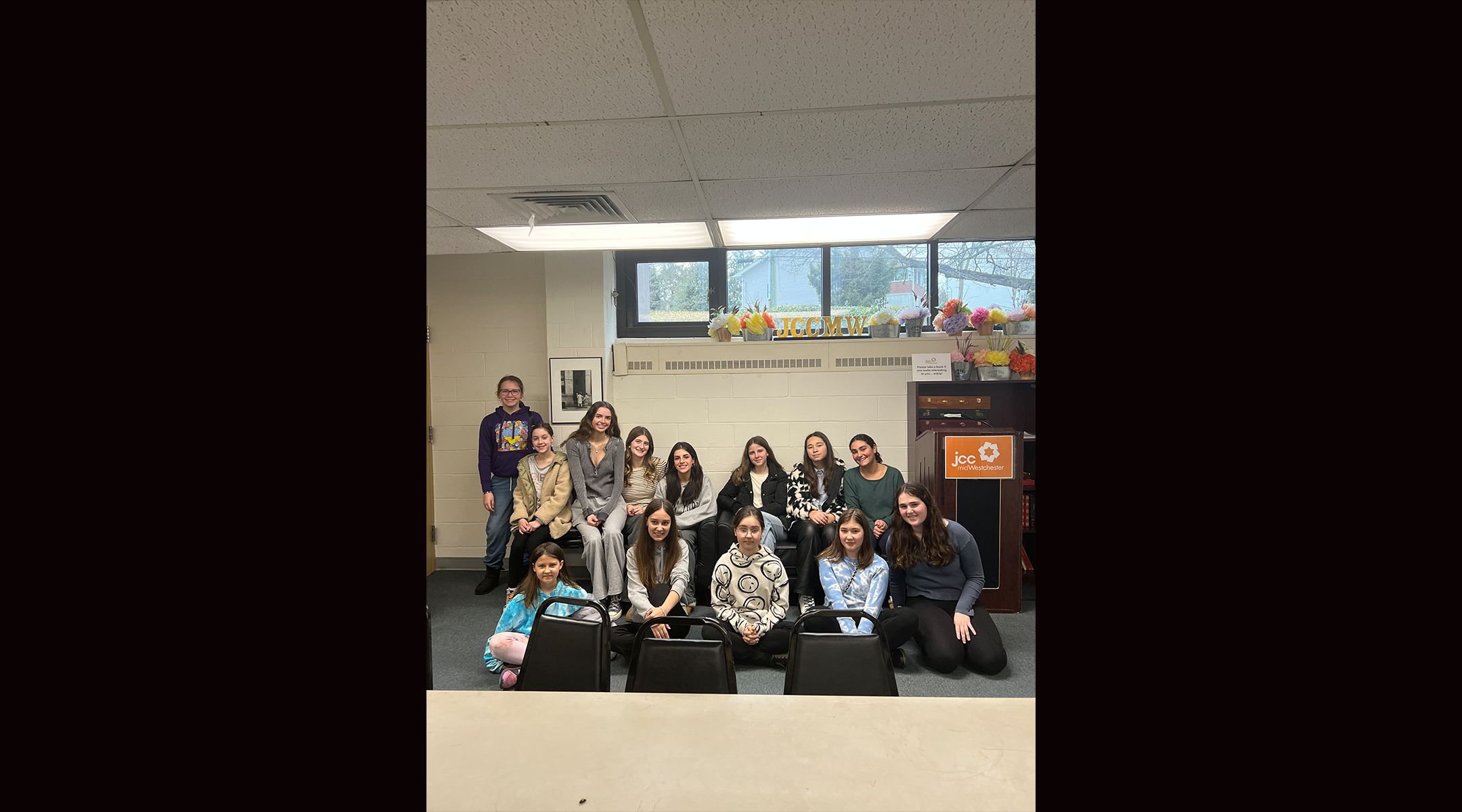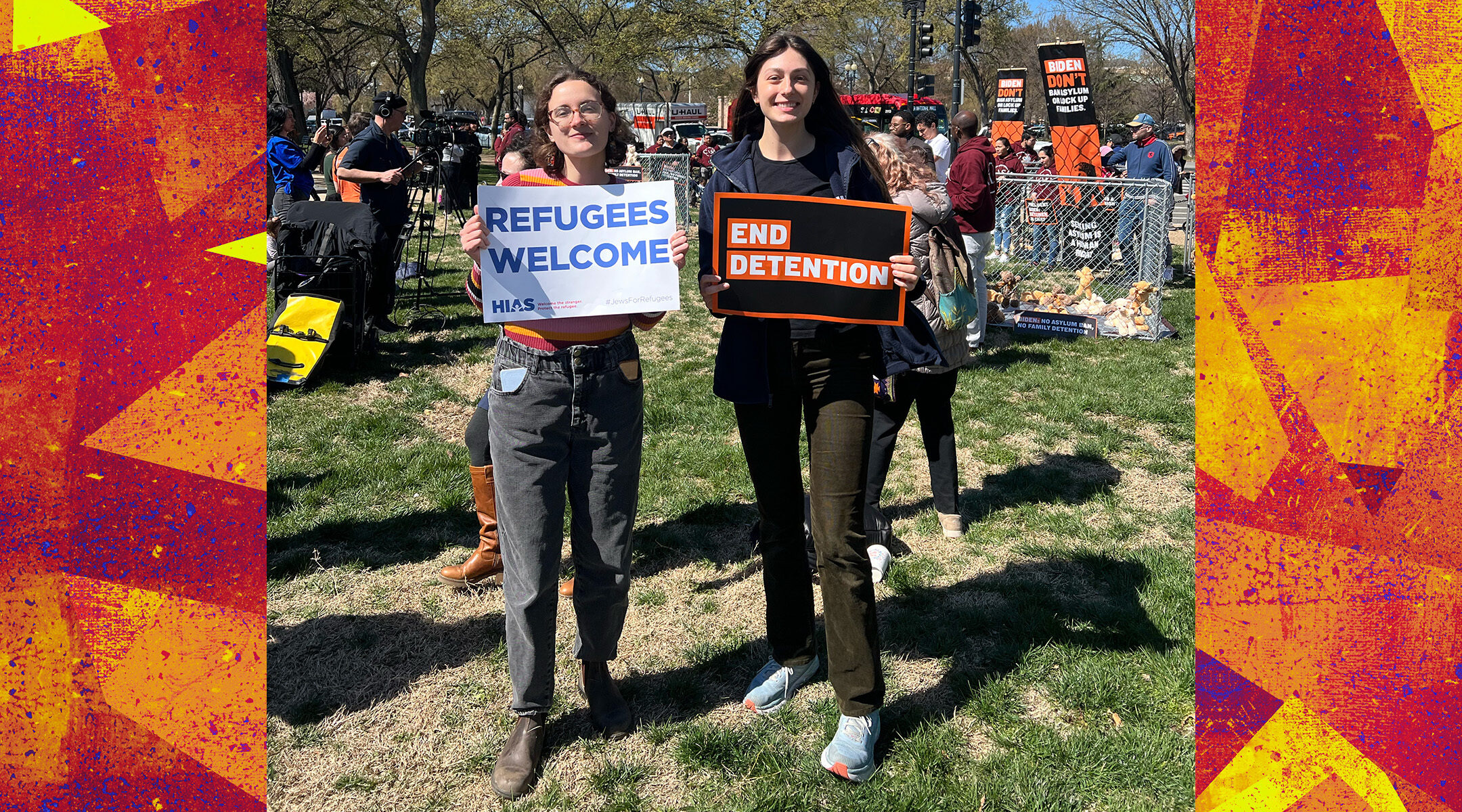This article was produced as part of JTA’s Teen Journalism Fellowship, a program that works with Jewish teens around the world to report on issues that affect their lives.
(JTA) — On a Sunday afternoon in February, a group of teens met for the first time at the JCC Mid-Westchester in Scarsdale, New York to make friendship bracelets and connections. Teens and tweens huddled together over a plastic folding table, some laughing and others deeply focused on beading plastic and elastic friendship bracelets.
These girls — six from New York’s Westchester County and eight Ukrainian refugees — gathered as part of the Westchester Jewish Coalition for Immigration. Partly organized by teen leaders, sophomores Jackie Kershner and Kate Douglass, the group gathered to create a safe space for the refugees and ease their struggles in acclimating to a new environment.
“It’s important to try and let these kids have as normal a life as possible and to let us have an influence on their life,” said Kershner, who has Russian and Ukrainian backgrounds and has recently started learning Russian. Outside of co-leading this group she tutors an Ukrainian girl from Ternopil, Ukraine through ENGin, a program that matches native English speakers with Ukrainian students who want to learn English.
Over the past year 271,000 Ukrainian refugees have fled to the United States with about 14,000 relocating in New York. The refugee organization HIAS reports that close to 200 refugees have resettled in Westchester County. More than half of them arrived in six months beginning in September 2021. With $21 million being invested by the federal government to support Ukrainian refugees in New York, a portion of this is being used by Jewish nonprofits that are incorporating Jewish American teens into their efforts to ease the transition for refugees.
Kershner’s co-leader, Douglass, empathizes with the recently displaced teens and tweens. “When I think of moving to a new school that can be so anxiety producing, so for what they are going through I can imagine that they just need an extra friend,” she said.
The experience is welcomed by Ukrainian teens. Valentyna Zabialo, who fled the country recently, is grateful for the opportunity.
“Finally I can speak with somebody else about our similar stories about school and friends, how I’ve fled to America, how I have moved countries, ” agreed Renata Uhlinsky, who fled from Odessa last July.

Ukrainian teens and American teen volunteers at the JCC Mid-Westchester. (Lydia Ettinger)
Holly Rosen Fink, the president and co-founder of Westchester Jewish Coalition for Immigration, sees the firsthand benefits from implementing bonding programs that teens and tweens like Uhlinsky engage in. “I know from our work from Ukrainians that everyone who fled from the war has experienced an immense amount of trauma, so we have created programs like this one to help them bond with others,” she said. “They are meeting teens who we see as the future of immigration work.
It’s important for teens to be part of the process, said Caroline Wolinsky, the volunteer coordinator at HIAS. The refugee assistance organization began as the Hebrew Immigrant Aid Society in 1902. “Teens bring not just energy but a knowledge of how the world works now, how to bring people together, and how to think creatively about problems,” said Wolinksy.
In the past year she has engaged with about 50 active teen volunteers in places ranging from El Paso, Texas to Washington D.C. They mostly engage in more traditional hands-on work such as assembling “dignity kits” to provide refugees with essential hygiene products, but bring their own skills to refugee work.
“A lot of modern organizing and change-making happens online and on social media and so I think using the tools which now have become a really intuitive part of how young people have grown up,” said Wolinsky. “It’s so hugely important to be able to use word processing documents and Google drive and things like that that may not come as naturally to older people, but do come very naturally to teens and really make a huge difference.”
Lyla Souccar, 16, feels a connection to refugee work through her family’s history: Her grandfather fled Egypt in the 1940s because of Jewish persecution and relocated to Brazil. From his stories, she took an interest in aiding those in similar situations.
“Jews are refugees in so many places because we are constantly getting hate, and in the Holocaust there were so many refugees after that [who] needed to move to so many different places,” said Soucar.
Souccar volunteers with Hearts and Homes, a New York nonprofit service organization that helps Afghan refugees resettle in partnership with HIAS. In 2021, 2.4 million Afghan refugees were registered worldwide — 41% women and 40% children. New York State has 7,500 Afghan refugees.
Through Hearts and Homes, Souccar created a club with her friend Keren Jacobowitz at The Leffell School, a Jewish day school in Westchester. The club fundraises, runs toiletry drives and spreads awareness about the plight of Afghan refugees. Later this school year, she has planned for an adult Afghan refugee to speak to the school. Beyond the classroom, she started working with two families through the organization as an intern this past summer, and has continued the work by helping the kids in those families with English and math homework.
“They were a little scared to get close to people, I remember the kids used to hide a little bit the first few weeks of me coming in, but now when I come in they run to the door,” Souccar said. “I definitely feel more connected to them, I’ve shared meals with them, I’ve watched TV with them, I just feel a lot more part of their life.”
The New York Jewish Week brings you the stories behind the headlines, keeping you connected to Jewish life in New York. Help sustain the reporting you trust by donating today.





